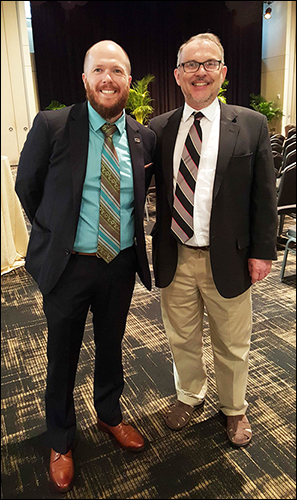Biomedical Engineering Professor David Merryman has received the School of Engineering’s inaugural Walters Family Chair. Merryman was recognized by Interim Chancellor and Provost Susan R. Wente and Philippe Fauchet, Bruce and Bridgitt Evans Dean, during a ceremony Sept. 16 at the Student Life Center.
“I am very honored to receive the recognition of being the inaugural Walters Family Chair and I’m thankful to both Tom Walters and Vanderbilt for making this possible,” said Merryman. “This endowed chair will allow my research team to undertake exciting new approaches in cardiopulmonary mechanobiology that we hope will one day impact patients.”

With heart disease being one of the leading causes of death, Merryman’s research is profoundly relevant in determining how to treat heart valve disease, pulmonary hypertension and heart failure, said Fauchet.
“David Merryman is an example of the exceptional faculty talent we have in the Vanderbilt School of Engineering. His commitment to and passion for discovery at Vanderbilt is deep and determined,” Fauchet said. “I am thrilled to honor his accomplishments and support his future.”
Merryman is the sole engineer on a six-person, international team that received a $6 million Leduc Foundation grant to use sophisticated new technologies to examine the different non-myocyte cells in both normal and diseased hearts.
Another recent grant – the result of one of only six winning R35 Emerging Investigator Award applications to the National Heart, Lung and Blood Institute so far – provides $5.3 million over seven years. It also funds his work in developing heart valves that may one day be able to grow along with children.
Merryman’s most promising work in the fight against deadly heart disease lies in the study of Cadherin-11 (CDH-11), a protein that acts as an adhesive between fibroblast cells. It manifests after myocardial infarction and in heart valve disease, gradually stiffening the tissue in a process called fibrosis that leads to calcification in the valves and heart failure.
“David fully represents the formula that allows the Vanderbilt School of Engineering to be held in high regard: excellence in research, teaching and service. I am extremely pleased that he is receiving inaugural Walters Family Chair,” Fauchet said.

“Tom Walters has devoted his energy, time, and resources to support the School of Engineering students and now faculty. From establishing the Walters Family Scholarship in Engineering to endowing the Walters Family Chair, he continues his family’s legacy,” Fauchet said. “I am so grateful to Tom and his family for their generosity.”
Thomas R. Walters, BE’76, received a bachelor’s degree in mechanical engineering from Vanderbilt and a master’s in ocean engineering from Texas A&M University. His two sons earned engineering degrees from Vanderbilt. Matthew, BE’08, majored in mechanical engineering and Jacob (BS’11) earned a his degree in engineering science.
Walters, who joined Exxon USA in 1978, retired as president of ExxonMobil Production Company in December 2016.
Walters has served the engineering school as chairman of its Committee of Visitors and he was inducted into the school’s Academy of Distinguished Alumni in 2011.
Contact: Brenda Ellis, (615) 343-6314
brenda.ellis@Vanderbilt.edu